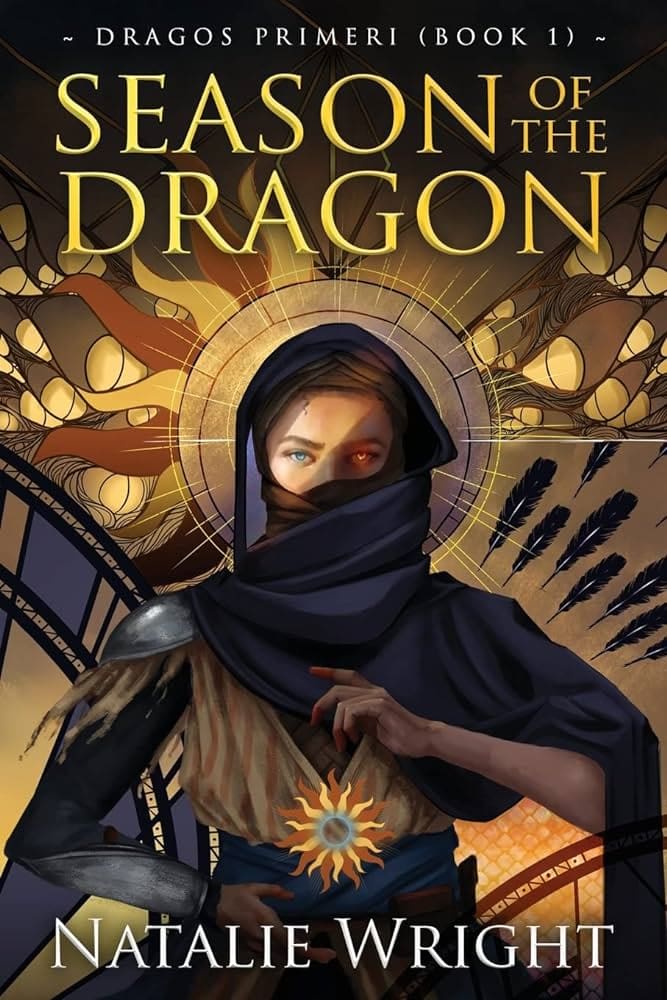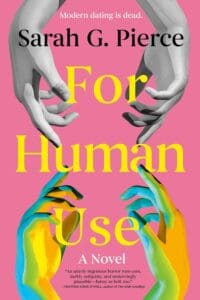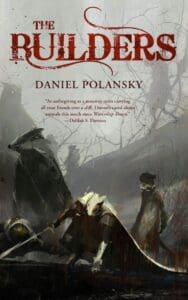
Synopsis
When a stranger enters Quen’s dusty village atop a giant black wolf, Quen’s world is turned upside down. Quen has stifled the bestial soul within her entire life. But on the cusp of her twentieth year, hiding the truth has become nearly impossible.
The stranger delivers a disturbing prophecy and reveals that Quen’s mother entered into a dark pact. Quen’s mother promised her unborn child’s soul to a dragon cult, and now the mysterious stranger has come to collect what is owed.
Seeking answers, Quen pursues the sorceress into the swirling desert sands. A trickster god deals a devilish hand, and Quen’s life begins to unravel as the prophecy foretold.
As Quen seeks answers—and the scaly hide of the dragon who razed her village—she finds kinship and a chance for love. But Quen will lose it all if anyone discovers the truth. For within Quen beats a second heart, and only one of her souls will survive this Season of the Dragon.
Quick Review
Season of the Dragon is a fun story with fantastic worldbuilding. My personal feelings around it are a bit complicated, but ultimately I’d recommend it to anyone looking for their next epic fantasy fix.
Full Review
Thanks to Natalie Wright for my gifted copy of Season of the Dragon, which I received after illustrating the book’s maps.
I’m not sure that Season of the Dragon is a 7/10 book. However, my feelings around it are complicated, and that score was the closest I could find to match it. Bear with me a moment, and hopefully you’ll see what I mean.
To me, the strongest part of this book is its setting. Menauld is a complex place with distinct regions and cultures. We see a few in this first book of the series, and venturing into each is a delight.
One of the best examples of this is the way Wright weaves the setting characters’ dialogue. They discuss the world and things happening in ways that make sense within it, unafraid to use in-world terms and languages, without being too confusing (most of the time).
The story is also really interesting. It feels both rooted in classic epic fantasy, but Season of the Dragon always finds ways to stand out in the crowd. After a dragon attacks her home, Quen goes on a quest to seek vengeance upon it. Along the way, she learns more about herself and the continent—and struggles against a shadow creature that lives inside of her.
The way that the creature and Quen duel for control ramps up throughout the book until it hits a breaking point. This could have easily been one of those irritating cliffhangers, but the ending is actually wrapped up quite well. There’s clearly more coming in this series, but Season of the Dragon can stand on its own, too.
So, there’s a lot to love in Season of the Dragon. I can absolutely see why it’s been getting rave reviews. Craig Jones gave the book 4.8/5 stars for IndieReader, Jamie Michele awarded it 5/5 stars for Readers’ Favorite, and Kirkus Reviews recommended picking up a copy. There’s something special here.
However, I had some difficulty getting into the book. I seem to be in the minority here, so don’t just take my word for it, but some parts of the writing and a few plot beats just never quite sat well with me.
I found the prose difficult to follow at times. In action scenes especially, I felt I was losing track of where the characters were too often. One escape scene in particular featured several mounted riders who should have been moving quickly. However, the entire battle seemed to take place around a single point. Not a deal-breaker, but enough of these moments happened to where I had to double-back and re-read some sections.
Speaking of the writing, Wright’s several fictional languages could become a bit difficult to keep track of, especially toward the end. There’s a glossary in the book which makes it easy to look up any term unique to this setting, but it’s a touch inconvenient nonetheless.
I also found Wright’s prose repetitive, either within the prose itself or due to an internal dialogue that would sometimes summarize what we just read. This might be good for anyone new to epic fantasy genre who needed more explanation. For myself, I found myself frustrated at reading what sometimes amounted to the same information twice (this did lessen after the first couple chapters, but never went away completely).
I will add that I’m personally not a fan of internal dialogue via italics—a technique that is used quite liberally in Season of the Dragon. It makes complete sense, especially as that internal duel between Quen and the thing inside of her escalates, but I can’t say that I was ever fully on board. That personal bias is certainly affecting my opinion here. If you don’t mind this kind of internal dialogue, or if you enjoy it, perhaps this is a non-issue for you!
Finally, Quen has a romance arc which was mostly fine, but it felt a bit rushed at times. I think that made sense for Quen’s character, but I’m not convinced it does for her partner. It’s difficult to expand on this without spoilers, unfortunately.
Perhaps you can see why I’ve been torn about this book for some time. On one hand, I think Wright is telling a really interesting story in a fantastic setting. Character relationships feel natural, and Wright keeps things moving with a surprisingly fast-paced story. On the other hand, I could not escape some of the smaller details that bothered me about the book. Ultimately, I recommend Season of the Dragon. It just didn’t work as well for me as I had hoped. If a revenge plot against a massive dragon sounds interesting to you, I suggest you give it a try, or at least check out some other reviews to get a second opinion.










Leave a Reply